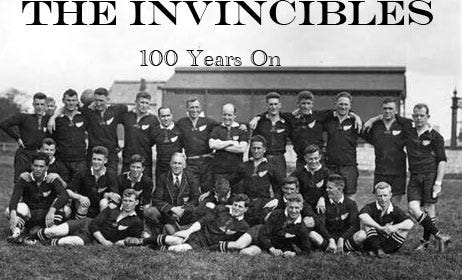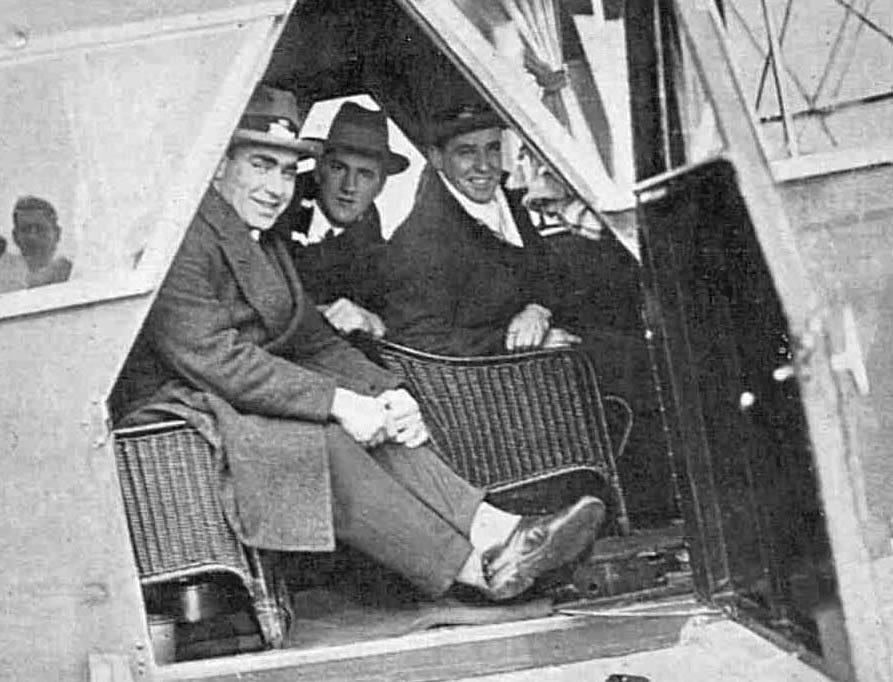A welcome pre-Christmas break before their last two games in England set the All Blacks up for their challenging tour conclusion, with the prospect of an unbeaten run through Britain and Ireland a tantalising prospect.
The players scattered far and wide for their break. Neil McGregor, Jimmy Mill, Lui Paewai, Quentin Donald, Ian Harvey and Herb Munro headed for Scotland. Manager Stan Dean, Gus Hart and Len Cupples flew to Germany.
McGregor said the strain of defending an unbeaten record affected the side, and a 10-day break between games was welcomed.
We are having a great time, but I won't be sorry when we leave for New Zealand. We are all looking forward to our trip across Canada.[1]
All Blacks captain Cliff Porter (left) with Ron Stewart and Jimmy Mill prepare for a flight over London, (Rugby Museum)
The penultimate game of the British and Irish leg of the tour was a second encounter against London Counties, but it was played at Blackheath. Conditions were foul. There was a general feeling that the Counties might have a chance at lowering the All Blacks on wet ground. They got their wish about the conditions in which the game was played.
I have never played under such bad conditions. The ground was saturated; a gale was blowing. It was a terrible day of wind, rain and mud.[2]
While many of the more well-regarded players shone, the first five-eighths, Neil McGregor most confirmed his advance on the tour.
The player who took my eye though was McGregor. Wherever there was work to be done, there was the wee McGregor, always ready to go down on the ball, to tackle the biggest of the Londoners, or to aid in an attack. Wet to the skin from frequent wallowing in the mud, his jersey hanging to his knees with the weight of moisture, he looked a picture of determination, and his constant grin won him the good feeling of every those who had not the capacity to appreciate his rugby.[3]
After about 15 minutes, the All Blacks scored when, from their 25-yard area, Cooke broke with the ball at toe, dribbling to the Counties' 25, where fullback [R K ] Melluish was caught, but not before clearing the ball. However, the ball went to the ground, and Cyril Brownlie arrived to pick it up and score between the posts.
A Counties' breakout was stopped when they dropped the ball at halfway. Nicholls picked it up and ran back to the 25, where he passed to Morrie Brownlie, who then got the ball away in a tackle to Donald who scored.
[J C 'Cliff'] Gibbs had a chance to demonstrate his speed when getting a long, high pass on the blindside. He ran down to Nepia, punted over him, and ran in at speed to reclaim the ball and score.
Nepia took a Counties' kick and ran along the sideline, leaving man after man in his wake until about 12 yards out from the goalline, he passed to McGregor, Svenson and Morrie Brownlie, who scored.
Playing with the wind at their back in the second half, the All Blacks were continually on attack, and consecutive passing movements resulted in Cyril Brownlie scoring twice. Mill made a break from halfback to feed Parker into a gap for a try. Another passing rush saw Richardson score, and the game finished with a pushover try to Bill Irvine for a 28-3 win. The weather had been no burden.
Colonel Phillip Trevor wrote in the Daily Telegraph: "
I deliberately describe the performance they gave as wonderful forward play, and indeed, I do not remember ever seeing such an exhibition. These seven big men were good with their feet; they were superlatively good with their hands.[4]
In the Daily News, Astral, summed up the feelings of many.
One does not know what the All Blacks have yet in store by way of answer to their critics when they meet England, but in their two games against London they very firmly extinguished many fond hopes that a metropolitan side might be able to check their invincible career. At Twickenham and Blackheath, they won each game against London by a margin of 25 points, and in the two matches have crossed the London line on 15 occasions.
At the Rectory Field they played on a quagmire and in a howling wind, but they made light of these supposed playing disadvantages and gave their finest display of the tour...There was a supposition cherished, on what basis I know not, that the New Zealand forwards were rather small beer on the mud slide, but their marvellous display at Blackheath exploded that theory very completely...
One has no fresh superlatives to employ at this stage of the tour to describe the wonderful play of the All Blacks. The better the side against them, on paper, the better they play. They have become an almost perfect instrument for playing the Rugby game, but the exhibition given by the forwards surprised me, although I have witnessed twenty of their matches, and thought I knew something of their capacity. It was not their power of getting the ball in the scrum, their quick heeling, or their fine dribbling rushes in the slippery mud that caused such astonishment, but the extraordinary transformation of the pack into a frontal set of three-quarters. They handled the ball like backs, and were always opening up the game.[5]
A special correspondent in The Guardian backed up the comments about the running ability of the forwards.
Cooke once more was the supreme player of the day, adapting himself as only real genius can to the most adverse conditions, revealing himself as wonderful an artist in breaks-through with the ball at his feet as he is, in normal circumstances, in these electrifying swerving runs. We have not seen his equal as a match winner since the war, since the ever lamented Ronald Poulton[6], that spell binder of pre-war days, Cooke as well earned a niche among with such centres as Poulton and Gwyn Nicholls in the gallery of the immortals.[7]
But close behind Cooke was Cyril Brownlie, who completed a hat-trick of tries.
This New Zealand giant was almost unstoppable when near the enemy's line, and in scoring his three tries, his anticipation and backing up played as great a part as his pace and weight. Like [Jim] Parker, he gets up a momentum that brushes aside would-be tacklers. Thus, the All Blacks come to their supreme task against England's chosen, with an unbroken record, rising from strength to strength, until they have become a weapon, forged in the furnace of conflict, that for combined skill, speed, and power can challenge comparison with any in the annals of Rugby football. Since they have but this one more match to play, they have perforce equalled the record of their predecessors of twenty years ago, and the odds would seem on their surpassing it.[8]
Nepia was also praised for his effort. The Sporting Life and Sportsman said if there was one member of the side who would never be forgotten it was Nepia. Playing in his 27th game of a tour which he started aged 20 years, he had handled a difficult ball as if playing in perfect conditions.
Nepia is one of the 'big' men of this side – Nicholls is another, and so is Maurice Brownlie – and if the tour has done nothing else but give us Nepia it has been successful.[9]
There were concerns for the side. 'Son' White was still nursing his injury from the Hampshire game, and Bert Cooke limped off the field at Blackheath a few moments from the end. However, with a week to prepare for the England Test, they were both able to be available for selection.
Gisborne writer Gordon C. Jones was in little doubt the All Blacks would triumph against England. And said after their second win over London Counties,
They did not, on Saturday, meet anything like the opposition they may expect in the Test, but they showed at least that they still have condition to burn, and their teamwork has never shown any signs of slipping back. That is going to be the deciding factor in the Test – teamwork. There will be any number of brilliant individualists in the England team, and W W Wakefield's leadership is always to be reckoned with, but the All Blacks have that faculty of covering one another to such good purpose that mistakes are remedied before advantage can be taken of them, and the fullest gain secured from such openings as occur.[10]
Scorers: London Counties 3 (J.C. Gibbs try) New Zealand 28 (Cyril Brownlie 3, Quentin Donald, Bill Irvine, Maurice Brownlie, Jim Parker, Jock Richardson tries; Mark Nicholls 2 con). HT: 3-11. Referee, T.J. Bradburn, NZ touch judge, L Simpson.
[1] Neil McGregor, Southland Times, 24 January, 1925
[2] Mark Nicholls, Weekly News, 24 December 1935
[3] Gordon C. Jones, Poverty Bay Herald, 6 February 1925
[4] Col. Philip Trevor, Daily Telegraph, 29 December 1924
[5] Astral, Daily News, 29 December 1924
[6] Ronald Poulton, a three-quarter who played 17 Tests for England between 1909 and 1914. He captained England to a Grand Slam in the 1914 Five Nations, scoring four tries against France in his final international. He was killed during the Second Battle of Ypres on 5 May 1915.
[7] Special correspondent, The Guardian, 28 December 1924
[8] ibid
[9] Touch Judge, Sporting Life and Sportsman, 29 December 1924
[10] Jones, Poverty Bay Herald, ibid





Fascinating stuff...great quotes from the English rugby press.